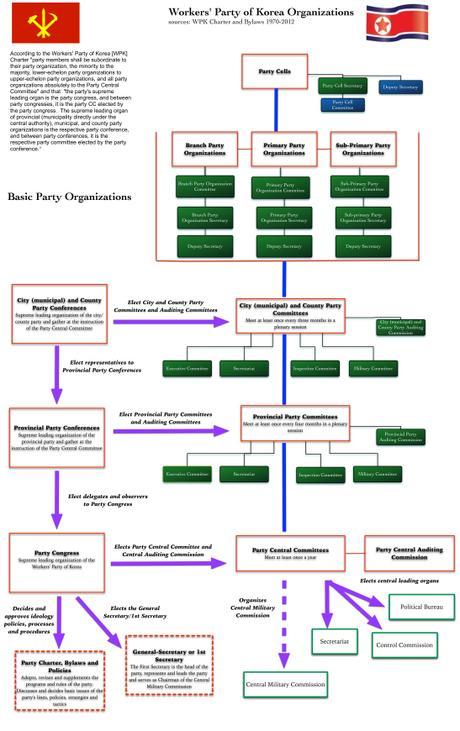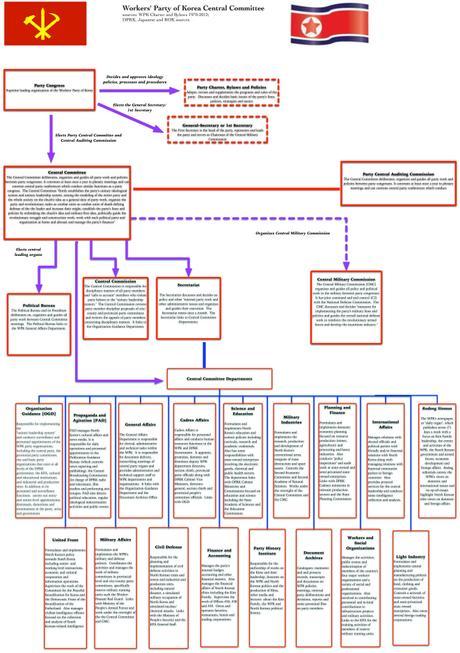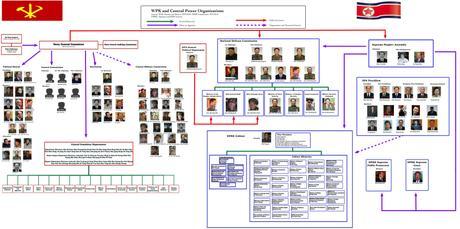With the convocation of the Seventh (7th) Congress of the Workers’ Party of Korea [WPK] on May 6 (Friday) some further information illustrating about what the congress will do and how the WPK relates to the DPRK Government and Korean People’s Army [KPA] might be useful.

Photo: NK Leadership Watch graphic
The Party Congress
As previously documented, delegates and observers to the Party Congress are elected by party conferences (or, meetings of party representatives) convened by provincial party committees along with party committees of the KPA, DPRK Cabinet ministries and the Korean People’s Internal Security Forces [KPISF]. These party conferences are the result of a process that occurs within “lower-echelon” party organizations (city/county party conferences, branch party organization meetings, etc.) which elect delegates to attend the provincial and institutional party conferences.
According to Chapter 3, sections #1 through 5 of the WPK Charter, the Party Congress does the following: reports on the work of the WPK Central Committee and the WPK Central Auditing Committee (commission); adopts, revises and/or supplements the programs and rules of the WPK; deliberates and decides basic issues of the party’s policies, policy lines and ideologies; elects the head and representative of the WPK, currently called the 1st Secretary and formerly known as the General-Secretary; and, elects the WPK Central Committee and WPK Central Auditing Committee (commission).

(Photo: NK Leadership Watch graphic).
The Party Congress and the Party Central Committee
Once the 7th Party Congress elects the WPK Central Committee and the WPK Central Auditing Committee, then the Central Committee is most likely to hold a plenary meeting (plenum) on the sidelines or after the Congress. The WPK Central Committee, which “organizes and guides” the WPK between party congresses will elect members of the WPK’s central power organizations, the Political Bureau, the Secretariat (piso’guk) and the Control Commission (also known as the Inspection Commission) and appoint directors of WPK Central Committee Departments. The WPK Central Committee will also “organize” the WPK Central Military Commission [CMC].
The Political Bureau technically controls party business and affairs between WPK Central Committee plenary meetings. It gathers top officials of the party, army and state and there are informally designated slots for specific DPRK officeholders (i.e. the leading officials of the DPRK Government, the KPA, the internal security services and the WPK Secretariat). Political Bureau members and alternate (candidate) members occupy the top positions in the DPRK’s formal power hierarchy.

(Photo: NK Leadership Watch graphic).
Filed under: 7th Party Congress, basic party organizations, Cadre Affairs, Central Committee, Central Military Committee, Central Party Affairs/Cadres 5th Section, central party life, Comprehensive Affairs, county/city party organizations, delegate selection, DPRK Cabinet, DPRK External Relations, DPRK Premier, Education Section (PAD), Events Management Section, General Affairs, Information Section, Joint Slogans, Kim Family, Korean People's Army (KPA), Korean People's Internal Security Forces, Korean Workers' Party (KWP), KPA basic party organizations, KPA branch party organizations, KPA General Political Bureau, KPA General Political Department, KPA General Propaganda Department, KPA Organization Department, KPA Party Life, KPA supernumerary organizations, KPA WPK Committee, kpif, Local Party Affairs, Membership Registration, ministerial/institutional party conferences, Ministry of Culture, ministry of people's security, Ministry of Railways, MPAF GPB, Organization and Guidance Department, party cells, Party History Institute, party life, Party Life Guidance, Political Bureau, primary party committees, Provincial Party Committees, provincial party conferences, Provincial Party System, public affairs and cultural events 7PC, Public Events, Secretariat, State Planning Commission (SPC), Supreme People's Assembly, Workers' and Social Organizations
